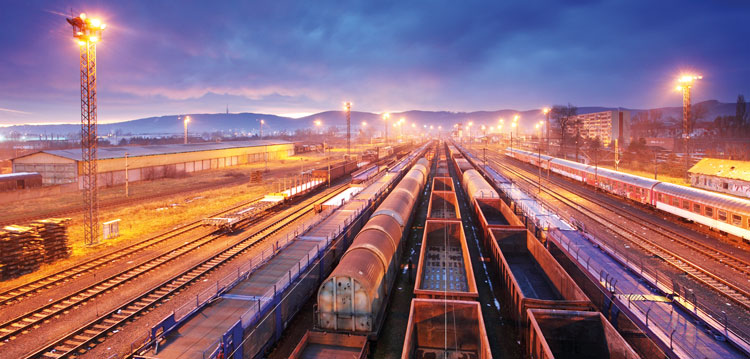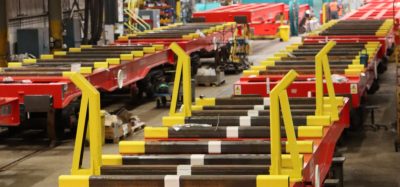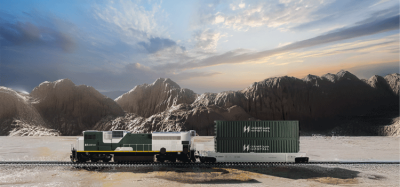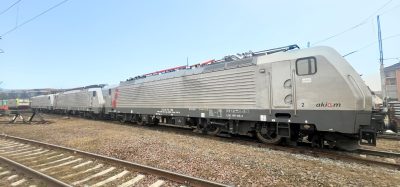Supporting competition and an innovative single European railway
Posted: 4 June 2015 | | No comments yet
ERFA, the European Rail Freight Association, brings together the newcomers on the European rail market. ERFA’s members range from railway undertakings to wagon keepers, freight forwarders, leasing companies and national rail associations, covering the whole value chain of rail transportation across Europe. All members are united in a commitment to work towards a competitive and innovative single European railway market underpinned by attractive, fair and transparent market conditions for all railway companies. Julia Lamb, ERFA Secretary General, explains more…


The rail sector’s newcomers distinguish themselves from the traditional incumbent operators, as from the beginning they have had to adopt a commercial and business-minded approach to ensure their existence and very survival on the market. Attracting customers with reliable, efficient and dynamic services has had to be the priority for the newcomers. It is by creating confidence in rail to deliver a service of quality that ERFA believes political will for the rail sector will be restored and along with it much needed public and private investment.
ERFA’s existence, since 2002, is firmly linked to the EU’s market opening agenda and its vision of reviving rail use. The opening up of the European rail market over the last 10 years has challenged the traditional rail monopolies of the past in favour of a competitive environment. There is wide-spread recognition that concentrating too much power in the hands of one company or organisation, be it public or private, drives away the incentive for innovation and efficiency and along with it a large share of the customers. Reversing that trend and capturing that growth potential have been at the centre of ERFA’s interest in a more dynamic rail sector.
Yet the rail newcomers have not always been given a helping hand in removing the shackles of the old monopoly mind-set that still prevails in rail. At a time when rail is being asked to step up its contribution to a more sustainable transport system, with ambitious growth targets set for rail to reach by 2030 and 2050, it is the problems left over from an outdated system that ERFA urgently seeks to tackle.
Better management of the infrastructure promotes higher efficiency
At ERFA we believe that infrastructure managers should act as the business partners of railway undertakings, striving to provide quality services for the operators of the network, who are in a competition for customers with the other modes of transport.
To address this issue, ERFA is seeking – via the 4th Railway Package – the latest rail reform initiative at European level, to boost the responsibilities and the independence of the infrastructure manager. Some of the basic functions of infrastructure management are currently carried out by a railway undertaking or by an infrastructure manager who is financially or otherwise linked with one railway undertaking. This is obviously incompatible with the concept of delivering choice for the end customers. For a competitive railway sector it is vital that the infrastructure manager is recognised as a facilitator of rail transportation for all its users, and not as the privileged business partner of the incumbent historic operator.
As a second step, ERFA seeks to address the natural monopoly status of infrastructure managers, so that they are responsive to the needs of users, and not simply detached administrators. This involves developing key performance indicators of infrastructure management that revolve around punctuality, capacity and productivity. Customers are crying out for more reliability and efficiency on the rail network and driving upwards the service offered by the infrastructure manager to the users will go a long way in improving the overall quality of the network.
Furthermore at a time when the biggest growth potential for rail is in long-distance (often meaning crossing one national border) and intermodal transport, ERFA is also pushing for more cooperation among infrastructure managers at European and intermodal level and welcomes the creation of PRIME – the European Infrastructure Manager’s Platform – as a means of achieving this. Improved cooperation means, on the one hand, infrastructure managers working together, overcoming operational differences from one network to another and driving efficiencies. It also means more planning and coordination with the other modes of transport to better connect rail services to the rest of the transport chain, ensuring rail comes to the customer and not the other way round.
ERFA believes that more cooperation and coordination between the infrastructure manager and the other rail stakeholders would bring huge benefits in terms of efficiency, investment, performance and growth on the rail network. ERFA strongly promotes the concept of ‘coordination committees’, as envisaged by the 4th Railway Package, which bring together infrastructure managers with the users of the rail network and local or regional authorities. This platform would provide at national and local level an opportunity for stakeholders to advise the infrastructure manager on issues such as intermodality and the needs of users related to maintenance and development of infrastructure capacity.
Finally, ERFA is a strong supporter of strengthening the voice of rail operators in defining their needs on the market and looks forward to the creation of a platform for railway undertakings at European level where issues of interest or concern to operators can be discussed with the European Commission and other rail stakeholders.
Optimising the use of rail facilities makes rail more attractive
The rail newcomers have often experienced difficulties in accessing marshalling yards or other essential train formation facilities. A freight train that cannot access a freight terminal cannot run an efficient service, which has the impact of ultimately reducing the level of choice available to customers and again rendering rail a less attractive modal choice.
A recent case in Poland has all too clearly highlighted some of the problems faced by rail newcomers. The Polish holding company PKP SA was found guilty in January 2015 of withholding public information over the existence of rail infrastructure. The impact of blocking information on public assets was that operators could not use basic facilities essential to rail transportation, as they simply did not know who owned the facilities. ERFA wants to ensure that in the future operators will not have to resort to legal action in order to simply obtain information on the existence of essential freight services!
That is why ERFA supports a fundamental shift in the way the provision of rail services is delivered to reflect the need for a more dynamic, efficient and competitive rail sector. Rail facilities that are largely funded with public money and that underpin the provision of basic rail services, i.e. facilities for loading goods, should not be managed in such a way that they block efficiency and the objective of encouraging greater use of the rail network. This means managing the facilities in a way that ensures optimal utilisation and non-discriminatory access for all operators. Part of this efficiency drive also means ensuring that a service facility no longer in use by its owner, is put up for rent or lease, so that other operators can make use of it for new freight services. This is all part of bringing new dynamics to the rail sector.
ERFA fully supports EU efforts to open a wider range of commercial and operational facilities in order to facilitate competition between railway undertakings. We will be working to ensure that practical measures are put into place by EU countries to ensure non-discrimination and accessibility.
Revenue raised by the rail sector reinvested into efficient rail services for customers
Financial transparency in the rail sector is an important pre-condition for a healthy rail system, particularly at a time when national budgets for rail investment are strained and also when political discourse is turning its attention to a more level playing field between the different transport modes. This in turn implies more transparency and scrutiny in the way the individual modes are subsidised by the taxpayer.
In this context it is important that funding aimed at infrastructure development is used for this purpose and not siphoned away by incumbent operators to increase their market share via acquisitions or to artificially lower their costs/increase the costs of their competitors. That is why over the years ERFA has consistently campaigned for full financial transparency. The limited state funding available for rail needs to be used responsibly and should support the attainment of public good objectives, in this case shifting more goods onto rail.
In this respect ERFA supports the court cases brought against Germany and more recently Austria over accusations that public funds may have been used to cross subsidise other transport services open to competition, such as freight or passenger services. Revenue raised by the infrastructure manager should go into reinvestment into the rail network.
There is a wider point to be made here. Lack of investment in rail is often cited as the critical issue holding back the sector’s potential. With limited public money available, it is clear that attracting private sector financing is important. The private sector can play a role in filling the funding gap, but only if the conditions are put in place to attract them to the rail sector. However, investors will not be attracted whilst they have the fear of political interference from incumbents, via for instance cross-subsidisation. Business and investors need a fair and transparent single market in rail to deliver the transport and environmental benefits that are essential to Europe’s future.
The rail newcomers stand ready to step up rail’s contribution to a more sustainable transport system. They want to capture new markets and to recapture lost ones by winning over the customers to rail. However they cannot do so without a full reform of the sector towards more market-orientation.
Biography
Julia Lamb has been ERFA Secretary General since July 2014. She is former Head of Cabinet for MEP Brian Simpson, the European Parliament’s Chair of the Transport and Tourism Committee. Julia has a solid background in EU policy making and transport. She worked for four years on transport policy in the European Parliament, developing a sound understanding of the EU decision-making processes and the dynamics at play when it comes to the transport sector.
Issue
Related topics
Cargo, Freight & Heavy-Haul, Interoperability & Liberalisation






